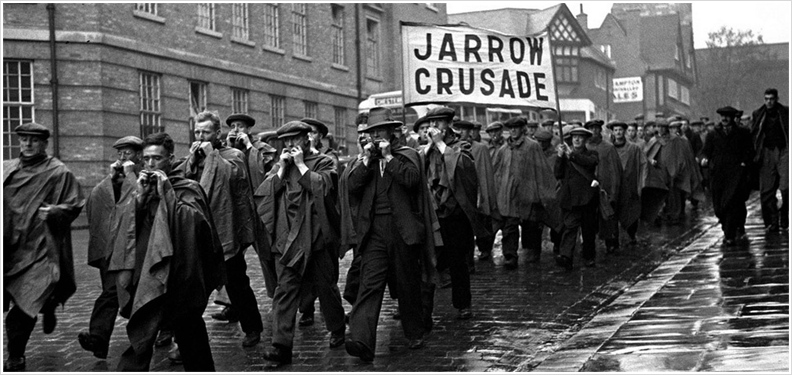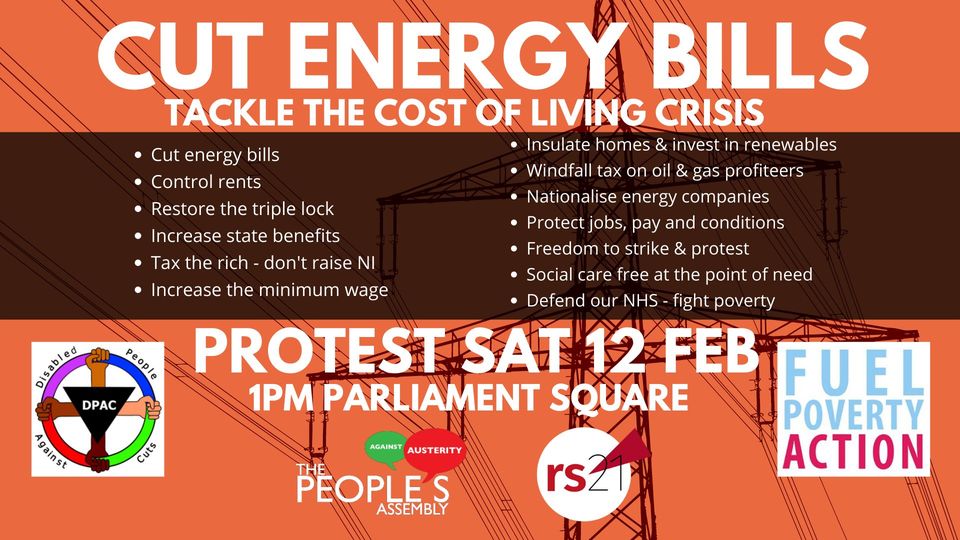Our rulers and their media are using the phrase ‘cost of living crisis’. It sounds neutral, outside of anyone’s control, practically an act of god. The government is presented as a benevolent, neutral force coming to people’s aid – to soften the effect of the crisis by its energy crisis package. More lies. Who is causing the cost of living crisis?
On the one hand, the owners of the energy-producing companies are doing what capitalists always do. In a global market where there is huge pent up demand for energy as the recovery takes off the price of their product will rise. As long as they control the market the prices will go up and their profits will go up. Shell and BP have made around £40 billion according to the latest reports.
On the other hand, governments are themselves responsible for attacking living standards. Governments have choices; they can regulate or control the energy market. If the energy providers are even partly publically owned it can intervene quickly to protect consumers from steep price rises. The French government is in that position and the energy companies are taking an 8bn euro hit and consumer prices will not rise as much as in Britain where they are likely to more than double.
What about the Rishi Sunak measures to cushion us from the big increases? The media have reported the £200 he is supposedly granting to everyone paying a bill. This is not a grant, it is a loan to be paid back over a five year period. You will still have to pay the rise sooner or later. Given that the average bill will rise by £700 at least the short term saving is still going to leave many households having to pay £500 or more a year extra. Sunak and the government are also hoping that the increasing gas prices will not continue after one year, something that experts doubt. Will they double this loan or extend it next year?
The Chancellor is also cutting £150 from the bill of council taxpayers in bands A to D. This is a real reduction but will have less effect than it appears. For a start all council tax bills will continue to rise above the rate of inflation as they did last year. The government continues to cut back on local government spending despite the need for increased services such as social care following the pandemic.
Many people do not pay council tax, particularly younger people in multi-occupation dwellings where the landlord often absorbs the cost of council tax into the overall rent. Will landlords reduce rent by £150 a house? Do not hold your breath on that one. At the same time there can be quite well off people living in band A to D houses. House council tax valuations are based on 1980 prices which are hopelessly out of date.
Conversely, people on lower incomes can just happen to be in a house in band E and above. This is particularly the case in London where formerly working-class areas had become gentrified before 1980. The government has said they will provide additional payments for people in those circumstances but both the amount of money and the means to reach these people are inadequate. Doubling the numbers entitled to the warm houses allowance does not fix the problem either.
Clearly Sunak decides on his ‘alleviation’ strategy not on the basis of genuine concerns to defend the living standards of working people but rather in electoral terms. The Tories electoral base will be less unhappy if they qualify for the £350 package. A policy more targeted at lower or average paid working people does not have the same impact.
Inflation is currently at more than 5% and is forecast to reach 7% in the Spring. Whenever the mass media or government spokespeople talk about the cost of living or inflation it is assumed that there is an average impact. In reality poorer and working people are always hit worse than better off people because a greater percentage of their income is spent on heating, housing and food. The £20 cut in Universal Credit has really meant the phrase we hear – heating or eating – has become a reality for many more people.
Poorer people are also unfairly treated by energy companies when they are on pre-payment ‘key’ plans for their energy. The costs of such plans are usually higher than the deals other customers can find.
Even for food and basic goods better off people can buy the bargains and offers in bulk and have bigger houses to store them. Poorer people have a week to week budget which prevents big purchases and they usually have less space for storage. The poorest of all who live in temporary accommodation with limited or non-existent cooking facilities often resort to unhealthy takeaway or processed foods that can even be worse value than fresh food ingredients.
No wonder today there are more food banks than branches of Greggs. Just to take one town, Sheffield, which has increased the number of food banks to 12! What you see on the TV reports with food bank depots as big as supermarkets is the creeping establishment of a whole ‘privatised’ charity welfare sector dependent on the worthy efforts of volunteers. Social capital enterprises and charities, often not paying their employees proper rates of pay, are taking over the administration of the welfare state. Worse of all, it is normalised, Britain is the sixth richest capitalist country in the world but millions are using food banks.
Local authority social workers and benefit offices refer poor people to these bodies, the welfare state has become partly redundant and the benefits system no longer covers basic needs. Enthusiasm for the new welfare state post-1945 was fired by people’s hatred for the charity hospitals and the shame of the lack of basic social security. The popular slogan was no return to the 1930s. Today we seem to be already well on the way back.

Interest rates increased the other day which means working people with mortgages will be paying more each month if they are not on a fixed rate. Today’s economy is partly fuelled by the huge amount of credit taken out by people, often to buy essential goods like washing machines. Anyone taking out loans will find it will cost them more. House prices are booming so it is harder and harder for young people to get a foot on the housing ladder.
National Insurance contributions (NICs) will be going up in April and this will affect nearly everyone. This is no different from income tax and is only called an insurance contribution because of the way the welfare state was set up by the post war government with a ‘social insurance’ principle for health and sick pay. It is not any more progressive than income tax and you even start paying it at a lower income.
The same percentage increase for somebody earning £20,000 compared to someone on £40,000 appears fair but the hit is not the same since the overall amount of disposable income left is still greater or the higher earner. Sunak might still change the entry level of paying NICs and equalise it with the Income tax threshold so the increase will hit fewer low paid people in order to display some ‘levelling up’ demagogy. He is desperate for his Tory leadership ambitions not to be tarnished with the cost of living crisis. People may not have noticed that by freezing tax thresholds in the last budget Sunak takes more people into higher tax brackets as inflation rises – another hidden tax rise.
Labour shortages, the weakening of the pandemic and some leadership changes in unions like Unite has resulted in an increased number of mostly local wage struggles. A generalisation of such struggles nationally would be one of the best responses to the cost of living crisis. However the draconian anti-trade union laws – never repealed by New Labour – makes national strike action very difficult to achieve as we saw with very low turnout making it impossible for UNISON to take action recently. Andrew Bailey, the governor of the Bank of England, who earns £600k, had the cheek this week to tell people not to strike for higher pay.
The Labour Party has put forward a package on the energy crisis which is more generous than the one Rishi Sunak is proposing. There would be £400 per customer and the lifting of VAT as well as a windfall tax on the energy companies’ profits. We support even partial measures like this. However, this would still mean everyone taking a hit and it is a temporary fix. Labour Party Conference policy has a much better line of taking the utilities back into common ownership. Such a policy could protect consumers against these rises and also develop a green energy transition. Keir Starmer and Rachel Reeves have dropped this popular policy in favour of waffle about different forms of common ownership.

A useful response from the Labour Party would be for it to take the lead in the demonstrations being organised in London and Manchester and a number of towns this Saturday 12 February against the attacks on our living standards. Not much hope of that. Nothing about the campaign can be found on the Labour Party website although some local parties and MPs will be supporting actions in their towns.

